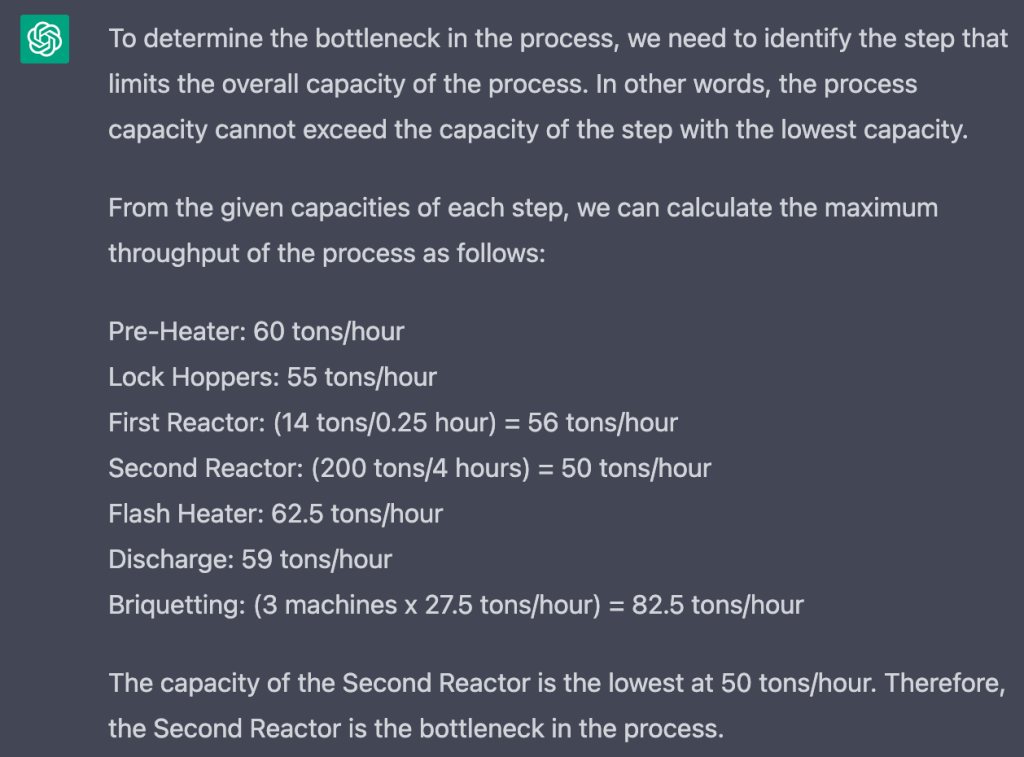
ChatGPT. He’s so hot right now.
By now there’s no doubt that you’ve heard about ChatGPT, the AI writing tool that’s taking the internet by storm. Some people think it’s the second coming, others think it’s here to destroy the world as we know it — but we here at Kicks just think it’s a pretty neat little program.
In this blog we’ll cover what ChatGPT is, some of its more impressive accomplishments to date, its applications across various industries, and why you shouldn’t always trust everything that comes out of a robot’s mouth.
But first, let’s hear from ChatGPT itself. We asked the program to write a short blog titled “What is ChatGPT?” and here’s what it spit out:
What is ChatGPT?
ChatGPT is a Generative Pre-trained Transformer (GPT) model developed by OpenAI. It is an advanced AI model that has been trained on a massive amount of text data from the internet to generate human-like responses in natural language processing (NLP) tasks.
The model has been trained to perform various NLP tasks, including text generation, question answering, and dialogue generation. ChatGPT can generate text that is almost indistinguishable from text written by a human, making it a powerful tool for various applications.
How does ChatGPT work?
ChatGPT uses the transformer architecture, which is a type of neural network designed specifically for NLP tasks. The model has been trained on a massive amount of text data, allowing it to generate coherent and relevant responses to a given prompt.
When a user inputs a prompt, the model generates a response by predicting the next word in the sequence. This process is repeated until the model generates a complete response.
The model uses the context of the conversation, as well as its training data, to generate a response that is relevant and coherent.
Conclusion
With its ability to generate human-like responses and take into account the context of a conversation, ChatGPT offers a powerful tool for automating various tasks and improving the efficiency of various processes. As AI technology continues to advance, we can expect to see even more exciting developments in the near future.
And now, back to your regularly scheduled human-written program
Now that the robots are out of the room, let’s get down to business. ChatGPT is basically just a computer program that lets you ask an AI a question, and it gives you a response worded like a human would respond.
It works by having the AI scuttle across the internet for answers, and using a predictive typing function to flesh out the response. You ask ChatGPT “What’s in a vodka cranberry?” and it will give you the non-surprising answer in short order.
But that’s just using ChatGPT as a glorified search engine. Where the program really shines is in its ability to follow specific, detailed prompts. You can feed it prompts like “What are 5 reasons why Tim Burton’s Batman Forever (1995) is an underrated classic?” and it will write out a surprisingly convincing argument.

You can even tell ChatGPT to respond in the voice of someone else. For instance, a wedding invitation penned by Frank Sinatra, or a video review as written by Foghorn Leghorn from Looney Tunes. I say, I say, boy, that’s pretty dang impressive for a box o’ bolts.
How smart is ChatGPT?
Scary smart, all things considered. ChatGPT’s intelligence is pulled from the internet at large, so it’s adept at speaking about everything from toilet bowl cleaners to brain surgery with a high level of expertise.
To put ChatGPT through the paces, professors at the University of Minnesota pitted the bot against exams from four different law courses. Without any human input, ChatGPT managed a C+ on each of the exams.
Up in the Ivy League, the bot earned a similar passing grade on a business management exam over at the University of Pennsylvania’s Wharton School of Business. You can see how ChatGPT showed its work to justify its answer in the image below.

On top of those accolades, ChatGPT also squeaked by with a passing grade on the U.S. Medical Licensing Exam. You read that right — a robot could legally practice medicine in America. Pretend like there’s a scathing quip here about our healthcare system, please and thank you.
Bear in mind that these aren’t just multiple choice questions or ones that call for a simple fact or figure. In each instance, ChatGPT was able to provide the logic and reasoning behind its answers — leaving a “superbly explained” response, according to one professor at the U of Penn.
What are some real-life uses for ChatGPT?
There are plenty! Professionals across various industries like healthcare, real estate and marketing have toyed with AI writing tools to varying degrees of success.
ChatGPT in the real world
While ChatGPT is new, AI writing programs are old hat across certain industries. News outlets like the Associated Press have been using AI to spit out first drafts of news stories for a decade.
In the present day, real estate offices have started tinkering with ChatGPT to streamline their listings. Realtor JJ Johannes found that he could generate descriptions of different properties in a matter of seconds, just by entering a few keywords. He walks through his process in this informative tweet, which he used for a listing on an Iowa home.

ChatGPT has even reared its head in politics. Congressman Jake Auchincloss, Democratic Representative for Massachusetts, used the bot to write a short speech backing a bill in support of an AI research center. A bit on the nose, but we’ll take it.
ChatGPT in marketing
Here in the marketing world, ChatGPT is equal parts routine time-saver and mind-blowing breakthrough in the way we do our jobs.
On the more mundane side of things, AI writing tools are a great companion for content creation. Whenever you bump into writer’s block, you can turn to ChatGPT to generate ideas for blogs, social posts, emails — you name it. Having that rough draft at your fingertips in a matter of seconds saves a lot of time and a lot of headache.
On the more exciting front, ChatGPT has a promising future as the default technology behind highly human chatbots. Chatbots are already in place on a lot of social media platforms and consumer websites, but often they’re limited to set responses that were written up by a human ahead of time.
With ChatGPT, chatbots could take on a life of their own. They could interact with customers in real time, offering personalized recommendations, suggestions and support based on input from the customer. It could resolve issues on the spot, leading to better customer satisfaction and reducing the workload of human customer support teams.
ChatGPT is an exciting new tool in the marketing kit, and we can’t wait to see how it shapes our industry moving forward.
Okay, ChatGPT sounds great. Now what’s the catch?
Now you’re asking the right questions.
You could fill a library with all of the articles already written about the ethical implications of AI writing tools like ChatGPT. We’ll leave the ethics to Aristotle, and instead focus on the easy target:
The biggest issue with ChatGPT right now is that it’s often riddled with embarrassing errors. Those mistakes can range from simple factual inaccuracies to bald-faced lies.
AI’s trouble with the truth
Even with the infinite amount of knowledge at its cold, digital fingertips, AI writing tools like ChatGPT can struggle with basic facts.
The same professor that put ChatGPT up against Ivy League exams noted that the bot made a lot of mistakes on simple math — we’re talking middle school-level multiplication and division here, not advanced trigonometry.
Google ran into some higher-stakes inaccuracies when it announced its ChatGPT rival, Bard. In a quick promotional video a father asks Bard, “what new discoveries from the James Webb Space Telescope can I tell my 9-year-old about?”
Bard rattles off a couple quick bullet points about newly discovered galaxies — but erroneously mentions that the JWST was the first telescope to take pictures of planets outside of our own solar system. In reality that honor goes to a completely different telescope, and the gaffe may have contributed to the 10% drop in Google share prices following the reveal.
Dreams of electric sheep
Even beyond simple factual inaccuracies, ChatGPT has a tendency to get creative with the truth — a habit that the industry calls “hallucinating.”
For instance, one Reddit user used ChatGPT to write a research paper on why people quit their jobs. The AI cited research from an author named S.C. Lewis, and wrote up a convincing abstract of Lewis’ scholarly article “Quiet quitting: A theoretical examination of employee turnover that is not preceded by overt behavioral indicators” from the Journal of Applied Psychology.
The only problem? The Journal of Applied Psychology never ran an article by that title. In fact, that article doesn’t even exist — and neither does S.C. Lewis.
These hallucinations seem to stem from ChatGPT’s predictive writing model. Whenever it’s dealing with well-documented information, it can accurately call up responses that are based on fact. But when it doesn’t find an exact match for your prompt, that’s when it does its best Pinnocchio impression.
So what’s Kicks’ take on ChatGPT?
ChatGPT is a powerful tool that’s capable of some pretty amazing feats of writing. But between factual errors and outright hallucinations, there are plenty of reasons to be wary of using ChatGPT without human supervision.
Our biggest concern is that ChatGPT is only as smart — or as accurate — as the information it reads on the internet. And as everyone who’s got an uncle on Facebook knows, the amount of fake news that’s out there is staggering and getting worse every day.
As the logic behind AI writing tools improves, we imagine they’ll become a ubiquitous part of marketing and plenty of other industries across the board. But for now, we say have some low-stakes fun with ChatGPT. Then give Kicks a call and see why you should still trust our living, breathing writers more than a bunch of 0’s and 1’s.
The average person spends nearly 20 hours a week on social media. How does yours rank?
Similar Posts
Sign up for updates.

Powered by Caffeine + Cocktails
Visit Us:
1043 Virginia Ave, Suite 211
Indianapolis, IN 46203
hello@kicksdigital.com
317.662.2881
© Kicks Digital Marketing. All Rights Reserved. | Privacy Policy
Knowledge
Company
© Kicks Digital Marketing. All Rights Reserved. | Privacy Policy



